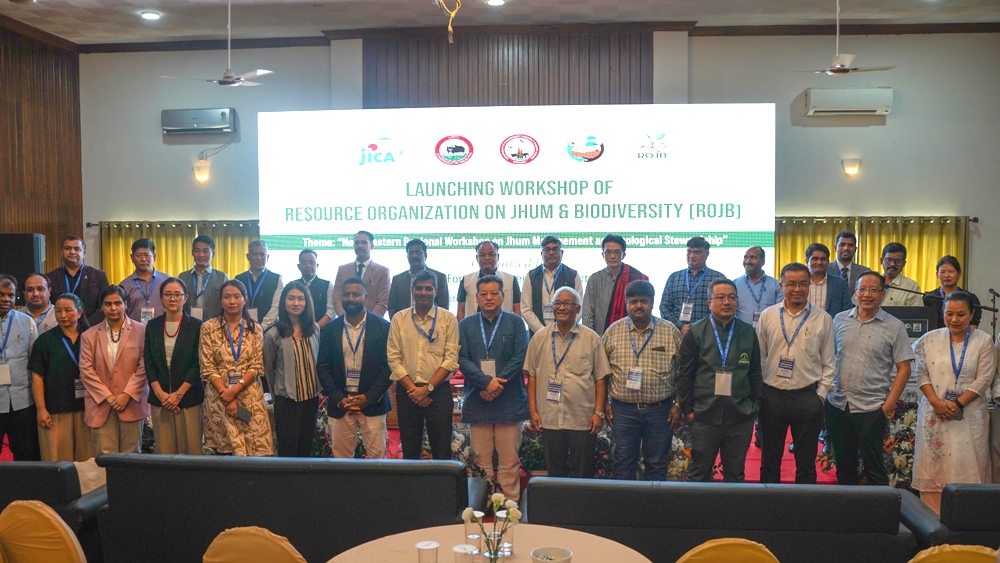Advisor H Tovihoto Ayemi inaugurates two-day workshop on Resource Organisation on Jhum and Biodiversity.
Share

DIMAPUR — Advisor for Tribal Affairs and Election Department, H Tovihoto Ayemi, formally inaugurated a two-day workshop on Resource Organisation on Jhum and Biodiversity (ROJB) here at Hotel Acacia on Tuesday.
The ROJB initiative is promoted by the JICA-assisted Nagaland Forest Management Project (NFMP) and hosted by the Department of Environment, Forest and Climate Change (EF&CC).
Speaking on the occasion, Ayemi said it was a privilege to be part of the launch and expressed appreciation to the EF&CC department, project team, and Japan International Cooperation Agency (JICA), for turning the vision into reality.
He mentioned that Nagaland is blessed with rich forests and unique biodiversity that help define the identity of Nagas as a people. He emphasised that Jhum cultivation, often misunderstood, is not just a method of farming but a way of life that has shaped food security, social bonds, and cultural practices of Nagas for generations.
Also read: Nagaland wins Best State award in sericulture sector
Ayemi however lamented that today Naga farmers face undeniable challenges, including shrinking fallow cycles, declining soil fertility, biodiversity threat and climate change.
In this context, he termed ROJB as a timely and visionary initiative, a centre of excellence and platform that will generate knowledge, innovate solution and strengthen community action to ensure that jhum and biodiversity can co-exist and flourish.
WATCH MORE:
Additionally, he highlighted three key pillar on which ROJB must stand. Firstly, it should focus on customary stewardship by collaborating with community institutions to document and scientifically validate traditional practices, empowering communities to make decisions about their landscapes.
Secondly, ROJB should prioritise science and learning to make jhum cultivation more sustainable, serving as a hub where traditional wisdom meets modern science. Lastly, it should promote inclusive policy by generating evidence that informs state policies and programs, ultimately transforming the landscapes.
Chief Representative of JICA India, Takeuchi Takuro, said that ROJB is not just an institution but a commitment to the people of Nagaland, their landscapes and ecological legacy.
He added that the institution will serve as a regional catalyst that would integrate scientific research, indigenous knowledge and policy innovation to address the complex realities of jhum cultivation and biodiversity conservation. Takuro expressed hope that it would evolve into a knowledge hub for Nagaland, the north-east and even the Himalayan region.
He further highlighted the progress of the Nagaland Forest Management Project, which has achieved approximately 38,000 hectares of plantation and formed 429 self-help groups to promote livelihood activities under the project.
The JICA chief representative said the project also integrates digital transformation tools to map jhum cycles, monitor biodiversity and connect farmers to markets and knowledge systems, while underscoring that human-to-human exchange and collaboration remain at the heart of transformation.
Managing Director of Intellecap, Jayesh Bhatia, shared that ROJB has been introduced as a dedicated platform for research, knowledge sharing and documentation on jhum cultivation and biodiversity.
The organisation aims to address the challenges faced by jhum farmers by promoting sustainable practices that improve soil fertility, conserve biodiversity, secure livelihoods and build climate resilience.
Its objectives include promoting research and policy advocacy, disseminating knowledge, and enhancing the capacity of stakeholders, Bhatia informed.
The inaugural programme was chaired by Dharmendra Prakash, Principal Chief Conservator of Forest & HoFF & CPD, NFMP, while welcome address was delivered by M Senthil Kumar, Addl. PCCF & Project Director (HRD & RE).
The programme was followed by technical session on the topic ‘Jhum in transition: Realities, risks and solutions’ and ‘Biodiversity and shifting cultivation: Indigenous and adaptive strategies for conservation.’